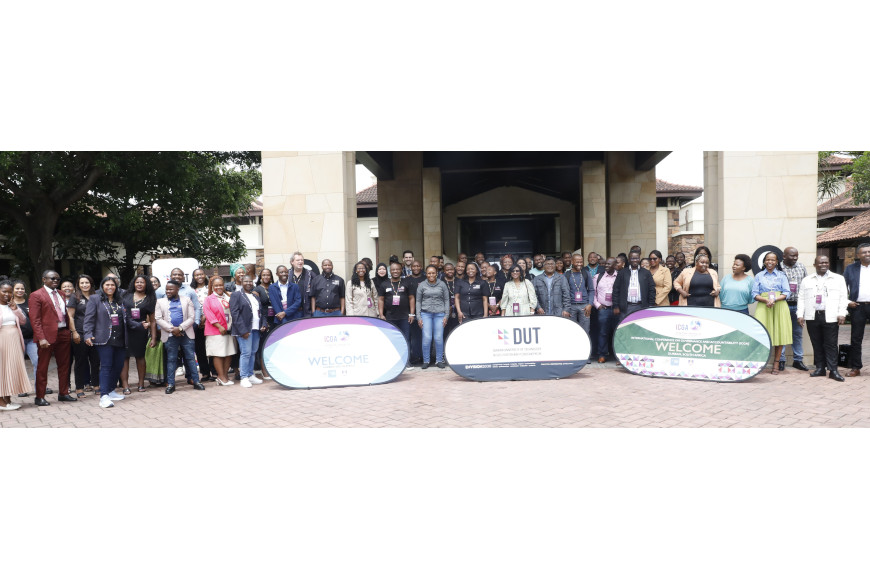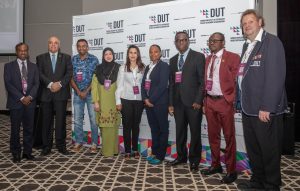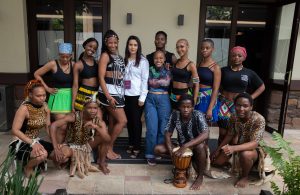The 9th International Conference on Governance and Accountability (ICGA) witnessed the assembly of an esteemed cohort of scholars, thought leaders and practitioners from across the globe, uniting in the pursuit of innovative governance solutions for a sustainable future. Co-hosted by Durban University of Technology (DUT) and Universiti Teknologi Mara (UiTM) from Malaysia, the conference was recently held over three days in Ballito, with delegates hailing from Japan, Malaysia, the UK, Ghana, Zimbabwe, Nigeria and South Africa.
Themed “Innovative Governance for Sustainable Futures” the ICGA 2024 aimed to foster an interdisciplinary exchange on governance and accountability, spotlighting cutting-edge research, recent trends and practical solutions within the global corporate governance landscape. Delegates explored urgent topics around Corporate and Environmental Governance, Technological Innovation and Ethical Leadership, all aimed at addressing the challenges posed by a rapidly changing global environment.
Professor Oludayo Olugbara, Executive Dean of the Faculty of Accounting and Informatics at DUT, expressed pride in the partnership with UiTM, highlighting the universities’ commitment to advancing governance research on a global stage.
“I am especially proud that DUT has co-hosted this collaborative event with UiTM, marking a significant step in our ongoing partnership. Together, we are setting new benchmarks for academic and professional discourse in governance,” said Professor Olugbara.
The conference’s opening session featured an impactful keynote address from Ms Hlengiwe Bhengu, Deputy Director-General and Chief Financial Officer of the Department of International Relations and Cooperation (DIRCO). Speaking on “Innovative Governance for Sustainable Futures: A Global Perspective,” Ms Bhengu highlighted the urgency of adaptable and responsible governance practices to address environmental, economic and social imperatives. The audience also enjoyed an energetic performance by DUT students from the Drama and Production Studies Department. The award-winning DUT Choir performed South Africa’s national anthem and three additional songs to the delight of the delegates, while the Malaysian national anthem was played in honour of UiTM.
A special moment during the opening session included a guest appearance from Neo, a robot from the Faculty of Accounting and Informatics at DUT, who captivated the audience on stage. Senior Director of Corporate Affairs, Mr Alan Khan, served as Programme Director, guiding the session with insights and engaging with Neo and with Artificial Intelligence (AI), which underscored the role of technology in the future of governance.
Professor Ferina Marimuthu, Conference Chairperson from the Faculty of Accounting and Informatics at DUT, shared her vision for the conference. “ICGA 2024 tackles a broad array of themes, from corporate responsibility and environmental governance to technological innovation and digital governance,” she explained. “Our dialogues on climate change mitigation, inclusive governance and ethical leadership showcased the critical role of research and collaboration in addressing the complex governance challenges that we face today.”
During her gala dinner address, Professor Marimuthu celebrated the conference’s remarkable achievements. “This year, we reached new heights with 168 submissions and 120 accepted papers. This was a powerful testament to the importance of our shared work. We hosted five keynote addresses by Hlengiwe Bhengu (DIRCO), Professor Erlane Ghani (UiTM), Ziaad Suleman (EOH), Tia van der Sandt (SAIPA) and Professor Kelum Jayasinghe (Sheffield University), along with two panel discussions with panellists Robert Parry (StatsSA), Ugen Moodley (KPMG), Keith Salimane (Bonakude), Professor NS Cooray (International University of Japan) and Professor Shazalina Shuhidan (UiTM), who provided thought-provoking insights that enriched every session. We welcomed representatives from seven countries and nearly every South African university,” remarked Professor Marimuthu.
A special highlight of the conference was the launch of the first Emerging Scholars Colloquium, where PhD candidates presented work-in-progress, receiving invaluable feedback from a distinguished panel of professors. Reflecting on the success of this initiative, Professor Marimuthu noted the inspiration sparked by these young scholars and the international mentors who guided them, stating, “Seeing so many PhD students present their research and leave filled with ideas and confidence was deeply rewarding.”
Another notable highlight was the incorporation of a workshop series that added invaluable insights. Professor Kelum’s workshop on publishing in top-tier journals empowered emerging researchers to share their voices more broadly whilst Professor Appiah’s session on sustainability reporting, sparked such dynamic discussions, that it extended well beyond its scheduled time, emphasising the significance of collaborative solutions for Africa’s unique governance challenges.
The conference earned high praise from attendees for its seamless organisation, professionalism and impact. Professor Dr Erlane Ghani of UiTM conveyed her heartfelt gratitude, stating, “I would like to take this opportunity to express my sincere gratitude and congratulations for the extraordinary conference you have organised. The event was well planned, engaging and seamless. Every aspect, from the insightful sessions to the efficient logistics, clearly reflected a significant amount of effort. There was plenty of time for in-depth discussions and networking and the atmosphere was friendly. On behalf of my Dean, Professor Dr Haslinda Yusoff and the Faculty of Accountancy from the Universiti Teknologi MARA, I would like to say thank you, for your team’s commitment and hard work. Congratulations once again!”
Professor Appiah from Ghana echoed these sentiments, remarking on the conference’s unique academic depth, “Wow, what an experience! Cultural diversity but scholarly harmony. Unlike other conferences, ICGA 2024 was not business as usual; the outcome of the conference included concrete initiatives, such as a planned research grant proposal on Sustainability Reporting in Africa.” He lauded the 9th ICGA’s support for impactful projects aligned with the United Nations Sustainable Development Goals (SDGs).
Other attendees echoed similar sentiments, with David Greenham, runner-up of the Emerging Scholars Colloquium award, noting, “The conference showcased a florilegium of budding research and the passionate panel discussions always spilled over into rich conversations. The unique insights from academics of such high calibre have undoubtedly shaped my doctoral journey.” Similarly, DIRCO Deputy Director-General Ms Hlengiwe Bhengu remarked, “It was indeed refreshing to be among such a distinguished group of intellectuals. Events like this are essential, as they foster collaboration and innovation, enabling us to better navigate our interconnected world.”
Other emerging researchers praised ICGA 2024 for its inclusivity, academic depth and exceptional organisation. Nolwando Mgilane, a PhD candidate, expressed her appreciation for the global networking opportunities, calling the conference “the most successful and impactful” she had ever attended. She noted, “The event brought together esteemed professionals from around the globe, creating a dream opportunity to expand my academic network.” Siphesihle Zungu, highlighted the supportive atmosphere that allowed open idea-sharing, stating, “As an emerging scholar, the experience has inspired me even more and expanded my perspective. The constructive feedback I received helped me grow as a researcher in a positive way.”
As the conference concluded after four inspiring days, the collective achievements and future commitments underscored its success. ICGA 2024 stands as a testament to the value of shared governance and accountability, reinforcing DUT and UiTM’s vision for a future rooted in sustainable governance and collaborative innovation.
Pictured: Attendees at the 9th International Conference on Governance and Accountability (ICGA).
Alan Khan/Professor Ferina Marimuthu



